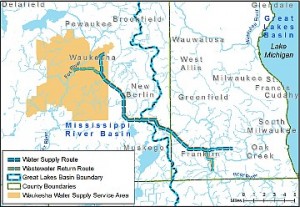Waukesha Diversion Approved; Focus Shifts to Potential Legal Challenges
This week the City of Waukesha celebrates the success of an impressive technical effort 13 years in the making. After inserting some final conditions, the Great Lakes Compact Council unanimously approved Waukesha’s application to divert water from Lake Michigan for its public supply. The application has generated significant regional and national interest because of its status as a “test case” for the Great Lakes Compact. The Compact generally bans diversions of Great Lakes water outside the Great Lakes basin, but offers limited exceptions for communities that straddle the basin  line, or that lie within counties that straddle the basin line, provided a community’s application meets certain stringent technical conditions. Waukesha is the first community wholly outside the Great Lakes basin to apply for a diversion (though not the first community to receive a diversion; New Berlin, which straddles the basin line, successfully achieved that distinction in 2009). As I have written previously in this space, the Waukesha case has been a striking demonstration that the process set up under the Compact works, no matter what one’s position on the outcome.
line, or that lie within counties that straddle the basin line, provided a community’s application meets certain stringent technical conditions. Waukesha is the first community wholly outside the Great Lakes basin to apply for a diversion (though not the first community to receive a diversion; New Berlin, which straddles the basin line, successfully achieved that distinction in 2009). As I have written previously in this space, the Waukesha case has been a striking demonstration that the process set up under the Compact works, no matter what one’s position on the outcome.
Yet from a legal perspective, that process may not be complete. The technical review and approval challenge remains subject to legal challenges. One vehicle for such a challenge is the Compact itself. It contains a “dispute resolution and enforcement” provision that offers redress to “any person aggrieved” by an action of the Compact Council or of a party to the Compact. The provision offers a glimpse of a legal process that may be just as complex as the technical approval process just completed.
